
REVISTA BRASILEIRA DE PARASITOLOGIA VETERINARIA
Scope & Guideline
Connecting Global Expertise in Veterinary Parasitology
Introduction
Aims and Scopes
- Diversity of Parasites:
The journal focuses on the identification and characterization of various parasitic organisms affecting a wide range of hosts, including domestic animals, wildlife, and fish. This includes both morphological and molecular studies. - Epidemiology and Risk Assessment:
Research published in the journal often includes epidemiological studies that assess the prevalence, risk factors, and geographic distribution of parasitic infections, providing critical insights for public health and veterinary practices. - Control and Management Strategies:
The journal features studies on the effectiveness of various control measures against parasites, including chemical, biological, and integrated pest management approaches. This includes research on anthelmintic resistance and the efficacy of alternative treatments. - Impact of Parasites on Health and Production:
A significant emphasis is placed on understanding how parasitic infections affect the health, productivity, and welfare of affected animals, alongside their economic implications for livestock and wildlife management. - Zoonotic Potential of Parasites:
The journal also addresses the zoonotic aspects of parasitic infections, exploring the implications for human health and the interface between wildlife, domestic animals, and humans.
Trending and Emerging
- Molecular Parasitology:
There is a growing trend towards molecular characterization of parasites, including genetic studies that reveal insights into species diversity, phylogenetics, and resistance mechanisms. - Anthelmintic Resistance and Alternatives:
Research on anthelmintic resistance is gaining traction, with studies focusing on the mechanisms of resistance and the exploration of alternative treatments, including natural products and integrated pest management strategies. - One Health Approach:
The integration of veterinary parasitology with public health and environmental concerns is increasingly prominent, emphasizing the interconnectedness of human, animal, and environmental health. - Impact of Climate Change on Parasitism:
Emerging studies are investigating how climate change affects parasite distribution, life cycles, and host-parasite interactions, highlighting the need for adaptive management strategies. - Use of Technology in Parasitology:
The application of new technologies, such as machine learning and predictive modeling, is on the rise, particularly in understanding and predicting parasitic infections and their impacts.
Declining or Waning
- Traditional Helminthology:
While still a relevant area, the frequency of studies solely focused on traditional helminths has decreased as researchers increasingly explore broader ecological and molecular aspects of parasitology. - In vitro Studies of Antiparasitic Efficacy:
The number of articles focusing exclusively on in vitro testing of antiparasitic agents has waned, possibly due to a growing preference for in vivo studies that better reflect real-world scenarios. - Case Reports of Rare Parasitic Infections:
There has been a noticeable decline in case reports detailing rare or unusual parasitic infections in animals, suggesting a shift towards more generalized and widespread epidemiological studies.
Similar Journals

KOREAN JOURNAL OF PARASITOLOGY
Connecting Researchers in the Fight Against ParasitesKorean Journal of Parasitology is a respected publication in the field of parasitology, originating from the esteemed Korean Society of Parasitology and affiliated with Seoul National University College of Medicine. Established in 1977, this journal focuses on disseminating significant research findings related to parasitic diseases, their vectors, and control measures, serving as a vital resource for researchers, medical professionals, and students alike. Although coverage in Scopus has been discontinued as of 2022, the journal remains a valuable platform for in-depth studies within the areas of Infectious Diseases and Immunology. With an ISSN of 0023-4001 and an E-ISSN of 1738-0006, the journal promotes open access to enhance academic sharing. Despite its current Scopus rankings, which place it in the 38th percentile for Infectious Diseases and 37th percentile for Immunology and Microbiology (Parasitology), it continues to contribute to the global discourse on parasitological research, encouraging collaboration and emphasizing the importance of this field in public health.
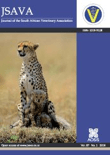
Journal of the South African Veterinary Association
Unlocking Knowledge for Veterinary Professionals WorldwideJournal of the South African Veterinary Association is a prominent Open Access journal dedicated to advancing the field of veterinary science since its inception in 1945. Published by MEDPHARM PUBLICATIONS PTY LTD, this journal stands out with an impactful HIndex and a commendable categorization in 2023, ranking Q3 in Medicine (miscellaneous) and Q2 in Veterinary (miscellaneous). With a Scopus rank of 96 out of 194 in the veterinary field, it serves as an essential resource for researchers, veterinary professionals, and students, promoting the dissemination of high-quality research and knowledge. The journal offers a platform for peer-reviewed articles covering diverse topics relevant to veterinary and animal health issues, encouraging expansive dialogue and collaboration within the academic community. Based in Centurion, South Africa, and accessible globally since it adopted an Open Access model in 1997, the journal exemplifies a commitment to accessibility and the sharing of knowledge.

INDIAN JOURNAL OF ANIMAL SCIENCES
Pioneering research for the challenges in animal sciences.INDIAN JOURNAL OF ANIMAL SCIENCES, published by the Indian Council of Agricultural Research, is a vital resource for researchers and professionals in the fields of animal science and veterinary studies. With its ISSN 0367-8318, the journal has been in circulation since 1971, providing a platform for innovative research and scholarly discourse. Despite its current Q4 ranking in Animal Science and Zoology and a Q3 ranking in Veterinary (miscellaneous), the journal aims to enhance its impact by promoting high-quality research that addresses the challenges in animal husbandry and veterinary practices in India and beyond. The journal does not operate under an Open Access model, which may limit certain dissemination opportunities; however, it remains indexed in Scopus, with a focus on elevating the standards of animal sciences. The INDIAN JOURNAL OF ANIMAL SCIENCES is pertinent for anyone looking to contribute to or stay informed about significant developments in animal sciences.
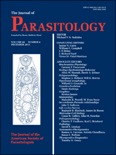
JOURNAL OF PARASITOLOGY
Unraveling the Mysteries of Parasitology Since 1945JOURNAL OF PARASITOLOGY is a leading scholarly publication dedicated to the field of parasitology, published by ALLEN PRESS INC. With an impactful history spanning from 1945 to 2024, this journal serves as a vital resource for researchers, professionals, and students interested in the complex interactions between parasites and their hosts. Operating from its base in the United States, this journal holds a Scopus quartile ranking of Q3 in Ecology, Evolution, Behavior and Systematics, Medicine (Miscellaneous), and Parasitology, providing a solid reflection of its impact within these categories. While currently not offering Open Access, the JOURNAL OF PARASITOLOGY continues to encourage the dissemination of pivotal research findings that contribute to our understanding of parasitic diseases and ecological systems, positioning it as an indispensable tool for knowledge advancement in the life sciences.

PARASITOLOGY RESEARCH
Exploring the intersections of health and parasitology.PARASITOLOGY RESEARCH, published by Springer, stands as a pivotal journal in the fields of parasitology, infectious diseases, and insect science, with a rich history dating back to 1987. Operating from Germany, this journal has garnered an impressive reputation, achieving a high ranking within various categories, including Q1 in Veterinary (miscellaneous) and Q2 across several relevant fields as of 2023. While it does not currently offer Open Access options, the journal remains a vital resource for researchers, professionals, and students seeking to contribute to and keep pace with advancements in parasitological studies. With a commitment to publishing high-quality research, PARASITOLOGY RESEARCH serves as an essential forum for disseminating findings that enhance our understanding of parasitic organisms and their impacts on health and the environment. Explore this journal to engage with cutting-edge investigations and reviews that drive innovation in parasitology and related disciplines.
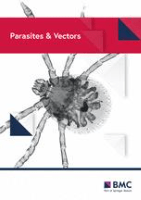
Parasites & Vectors
Advancing knowledge on the frontlines of infectious diseases.Parasites & Vectors is a leading open access journal dedicated to the dissemination of high-quality research on the vectors of infectious diseases and their parasitic agents. Published by BMC in the United Kingdom, this journal has been at the forefront of its field since its establishment in 2008, contributing to our understanding of vector-borne pathogens through its rigorous peer-reviewed articles. With a notable impact factor and categorized in the top quartile (Q1) in both Infectious Diseases and Parasitology, it is an essential resource for researchers, professionals, and students worldwide. The journal ranks impressively within various categories, holding a position of 7th out of 194 in Veterinary General Veterinary and 12th out of 79 in Immunology and Microbiology Parasitology, indicating its significant contribution to the sciences. Accessible to all, Parasites & Vectors supports the global pursuit of knowledge in epidemiology and disease control, making it an indispensable platform for sharing innovative findings and fostering collaboration within the scientific community.
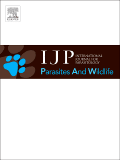
International Journal for Parasitology-Parasites and Wildlife
Unraveling Complexities of Parasites in NatureThe International Journal for Parasitology-Parasites and Wildlife, published by ELSEVIER, is a premier open-access journal dedicated to advancing the field of parasitology and wildlife research. Established in 2012, this influential journal has garnered a reputation for excellence, as evidenced by its impressive rankings, including Q1 in Animal Science and Zoology and Q2 in both Infectious Diseases and Parasitology as of 2023. With an ISSN of 2213-2244, this journal serves as a critical platform for researchers, professionals, and students, fostering a deeper understanding of parasite-host interactions and their ecological impacts. The journal encourages innovative studies that contribute to the mitigation of infectious diseases and enhance wildlife conservation efforts. With a commitment to open access, the International Journal for Parasitology-Parasites and Wildlife ensures that cutting-edge research is easily accessible to the global scientific community, helping to bridge gaps in knowledge and stimulate further inquiry.
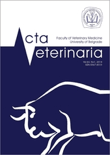
ACTA VETERINARIA-BEOGRAD
Fostering collaboration in veterinary research and practice.ACTA VETERINARIA-BEOGRAD is a distinguished academic journal dedicated to the field of veterinary science, focusing on a broad spectrum of topics pertinent to veterinary medicine and animal health. Published by SCIENDO, this journal has been an open-access resource since 2014, facilitating the dissemination of valuable research findings and innovations to a global audience. With an ISSN of 0567-8315 and an E-ISSN of 1820-7448, it plays a critical role in promoting accessible knowledge in veterinary practices while contributing to the advancement of the field. Located in Poland, this journal notably ranks in the Q3 quartile for veterinary studies, reflecting its ongoing commitment to quality and relevance. The journal welcomes contributions from a diverse range of veterinary disciplines, making it a vital platform for researchers, practitioners, and students alike who aspire to advance their understanding and impact within the veterinary community.
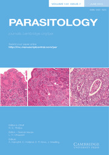
PARASITOLOGY
Exploring innovative insights into infectious diseases.PARASITOLOGY, published by Cambridge University Press, is a prestigious journal that has been at the forefront of research in the field of parasitology since its inception in 1908. This esteemed publication carries the ISSN 0031-1820 and E-ISSN 1469-8161, and its rigorous peer-reviewed articles provide insights into both fundamental and applied aspects of parasitic biology, infectious diseases, and host-parasite interactions. With a commendable impact factor, PARASITOLOGY ranks in the top quartile (Q1) for Animal Science and Zoology and holds Q2 rankings in both Infectious Diseases and Parasitology categories, indicating its significant influence and contribution to these disciplines. The journal's diverse scope allows for a broad range of research articles, reviews, and case studies, making it an essential resource for researchers, professionals, and students seeking to stay updated on the latest developments in the field. Based in the United Kingdom, PARASITOLOGY offers valuable access to critical research in an era where understanding parasitic diseases is more vital than ever, and continues to shape the future of this important scientific field.

Parasite
Advancing knowledge in parasitology for a healthier world.Parasite is a distinguished open-access journal published by EDP Sciences S A based in France, specializing in the multifaceted field of parasitology and related disciplines. Since its inception in 1994, it has played a pivotal role in advancing research in Agricultural and Biological Sciences, Animal Science and Zoology, Infectious Diseases, Insect Science, and Veterinary Sciences, earning a prominent place in the academic community with its 2023 rankings placing it in the Q1 category for several key areas. With an impact factor reflective of its quality and engagement, the journal fosters a collaborative environment for researchers, professionals, and students to disseminate and access high-quality studies and reviews. Operating under an open-access policy since 2013, Parasite ensures that cutting-edge research is accessible to a global audience, thereby promoting knowledge sharing and innovation in the field. For more information, please visit the journal's homepage and explore its extensive repository of articles that contribute to the understanding of parasitic interactions and their implications in health and agriculture.